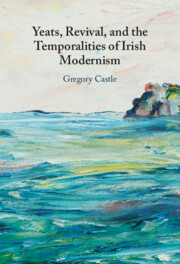Book contents
- Yeats, Revival, and the Temporalities of Irish Modernism
- Yeats, Revival, and the Temporalities of Irish Modernism
- Copyright page
- Dedication
- Contents
- Figures
- Acknowledgments
- Note on Citations
- Abbreviations
- Introduction Time, Recognition, and the Worlds of Yeats’s Work
- Chapter 1 The Irish Revival and Yeats’s Literary Nationalism
- Chapter 2 “A Dream-Heavy Land”
- Chapter 3 “O When Will It Suffice?”
- Chapter 4 “The Age-Long Memoried Self”
- Chapter 5 “I Make the Truth”
- Chapter 6 “They Had Changed Their Throats”
- Conclusion
- Works Cited
- Index
Chapter 2 - “A Dream-Heavy Land”
Other Worlds in Yeats’s Early Poetry and Drama
Published online by Cambridge University Press: 11 April 2024
- Yeats, Revival, and the Temporalities of Irish Modernism
- Yeats, Revival, and the Temporalities of Irish Modernism
- Copyright page
- Dedication
- Contents
- Figures
- Acknowledgments
- Note on Citations
- Abbreviations
- Introduction Time, Recognition, and the Worlds of Yeats’s Work
- Chapter 1 The Irish Revival and Yeats’s Literary Nationalism
- Chapter 2 “A Dream-Heavy Land”
- Chapter 3 “O When Will It Suffice?”
- Chapter 4 “The Age-Long Memoried Self”
- Chapter 5 “I Make the Truth”
- Chapter 6 “They Had Changed Their Throats”
- Conclusion
- Works Cited
- Index
Summary
Chapter 2 focuses on the early poetry and drama, in which Yeats discovers the worldmaking potential of art and creates at least two kinds of autonomous imaginary worlds: an impossible one based on the otherworld of faery, a parallel world of nonhuman beings and magical practices, and a possible one based on the private world of the lover and beloved, a world created in the artistic recasting of memory and desire. In the poetry, temporality is recursive and generative, with aspects of the past and future arranged in a nested fashion so that temporal moments are embedded in one another and, in a sense, produce one another. The early drama tends to express this tensed temporality in terms of the confrontation between two worlds: the actual world and the faery otherworld. These tensed temporalities enable both an accommodation of what is outside the realm of human experience and a renewed sense of the nature and limits of that experience. Misprision – the strange deceptions of the faery otherworld on the one hand and the recollected fantasies that structure so many of the early poems on the other – characterizes these new temporal arrangements.
Keywords
- Type
- Chapter
- Information
- Yeats, Revival, and the Temporalities of Irish Modernism , pp. 53 - 85Publisher: Cambridge University PressPrint publication year: 2024

